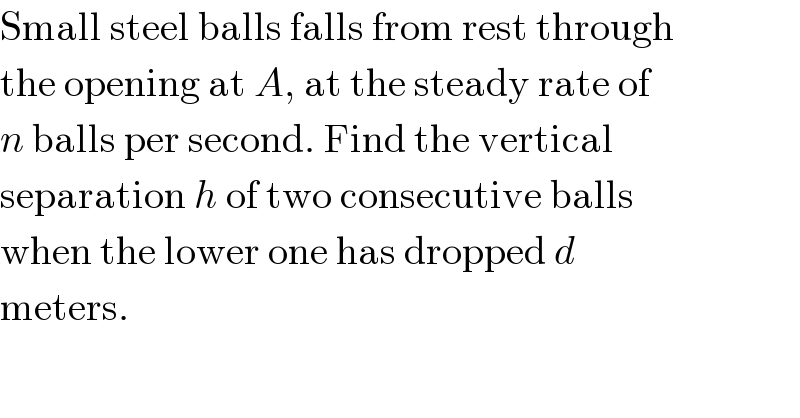Question Number 15102 by Tinkutara last updated on 07/Jun/17

$$\mathrm{Small}\:\mathrm{steel}\:\mathrm{balls}\:\mathrm{falls}\:\mathrm{from}\:\mathrm{rest}\:\mathrm{through} \\ $$$$\mathrm{the}\:\mathrm{opening}\:\mathrm{at}\:{A},\:\mathrm{at}\:\mathrm{the}\:\mathrm{steady}\:\mathrm{rate}\:\mathrm{of} \\ $$$${n}\:\mathrm{balls}\:\mathrm{per}\:\mathrm{second}.\:\mathrm{Find}\:\mathrm{the}\:\mathrm{vertical} \\ $$$$\mathrm{separation}\:{h}\:\mathrm{of}\:\mathrm{two}\:\mathrm{consecutive}\:\mathrm{balls} \\ $$$$\mathrm{when}\:\mathrm{the}\:\mathrm{lower}\:\mathrm{one}\:\mathrm{has}\:\mathrm{dropped}\:{d} \\ $$$$\mathrm{meters}. \\ $$
Commented by Tinkutara last updated on 07/Jun/17

Answered by mrW1 last updated on 07/Jun/17
![ball 1: d=(1/2)gt_1 ^2 t_1 =(√((2d)/g)) ball 2: d_2 =(1/2)g(t_1 −(1/n))^2 h=d−d_2 =(1/2)g[t_1 ^2 −(t_1 −(1/n))^2 ] =(1/2)g(2t_1 −(1/n))((1/n)) =(g/(2n^2 ))(2n(√((2d)/g))−1)](https://www.tinkutara.com/question/Q15110.png)
$$\mathrm{ball}\:\mathrm{1}: \\ $$$$\mathrm{d}=\frac{\mathrm{1}}{\mathrm{2}}\mathrm{gt}_{\mathrm{1}} ^{\mathrm{2}} \\ $$$$\mathrm{t}_{\mathrm{1}} =\sqrt{\frac{\mathrm{2d}}{\mathrm{g}}} \\ $$$$\mathrm{ball}\:\mathrm{2}: \\ $$$$\mathrm{d}_{\mathrm{2}} =\frac{\mathrm{1}}{\mathrm{2}}\mathrm{g}\left(\mathrm{t}_{\mathrm{1}} −\frac{\mathrm{1}}{\mathrm{n}}\right)^{\mathrm{2}} \\ $$$$\mathrm{h}=\mathrm{d}−\mathrm{d}_{\mathrm{2}} =\frac{\mathrm{1}}{\mathrm{2}}\mathrm{g}\left[\mathrm{t}_{\mathrm{1}} ^{\mathrm{2}} −\left(\mathrm{t}_{\mathrm{1}} −\frac{\mathrm{1}}{\mathrm{n}}\right)^{\mathrm{2}} \right] \\ $$$$=\frac{\mathrm{1}}{\mathrm{2}}\mathrm{g}\left(\mathrm{2t}_{\mathrm{1}} −\frac{\mathrm{1}}{\mathrm{n}}\right)\left(\frac{\mathrm{1}}{\mathrm{n}}\right) \\ $$$$=\frac{\mathrm{g}}{\mathrm{2n}^{\mathrm{2}} }\left(\mathrm{2n}\sqrt{\frac{\mathrm{2d}}{\mathrm{g}}}−\mathrm{1}\right) \\ $$
Commented by Tinkutara last updated on 07/Jun/17

$$\mathrm{Thanks}\:\mathrm{Sir}! \\ $$
Answered by ajfour last updated on 07/Jun/17
![Δt=(1/n) ; let s_i be the height through which i^( th) ball has fallen at a certain instant of time. Let also that the duration of its fall till tbat time instant is t. s_i =(1/2)gt^2 = d ⇒ 2t= (√((8d)/g)) ....(i) then s_(i+1) =(1/2)g(t−𝚫t)^2 Δh= s_i −s_(i+1) = (g/2)[t^2 −(t−𝚫t)^2 ] =(g/2)(𝚫t)(2t−𝚫t) =(g/2)((1/n))((√((8d)/g))−(1/n)) 𝚫h=(g/2)((√((8d)/(n^2 g)))−(1/n^2 )) .](https://www.tinkutara.com/question/Q15118.png)
$$\Delta{t}=\frac{\mathrm{1}}{{n}}\:;\:\:\:{let}\:{s}_{{i}} \:{be}\:{the}\:{height}\: \\ $$$${through}\:{which}\:\boldsymbol{{i}}^{\:{th}} \:{ball}\:{has}\:{fallen} \\ $$$${at}\:{a}\:{certain}\:{instant}\:{of}\:{time}.\:{Let} \\ $$$${also}\:{that}\:{the}\:{duration}\:{of}\:{its}\:{fall} \\ $$$${till}\:{tbat}\:{time}\:{instant}\:{is}\:\boldsymbol{{t}}. \\ $$$$\:\:\boldsymbol{{s}}_{\boldsymbol{{i}}} =\frac{\mathrm{1}}{\mathrm{2}}{gt}^{\mathrm{2}} \:\:=\:\boldsymbol{{d}} \\ $$$$\Rightarrow\:\mathrm{2}\boldsymbol{{t}}=\:\sqrt{\frac{\mathrm{8}\boldsymbol{{d}}}{\boldsymbol{{g}}}}\:\:\:\:\:\:\:….\left({i}\right) \\ $$$$\:\:\:{then}\:\:\boldsymbol{{s}}_{\boldsymbol{{i}}+\mathrm{1}} =\frac{\mathrm{1}}{\mathrm{2}}\boldsymbol{{g}}\left(\boldsymbol{{t}}−\boldsymbol{\Delta}{t}\right)^{\mathrm{2}} \: \\ $$$$ \\ $$$$\Delta\boldsymbol{{h}}=\:\boldsymbol{{s}}_{\boldsymbol{{i}}} −\boldsymbol{{s}}_{\boldsymbol{{i}}+\mathrm{1}} \\ $$$$\:\:\:\:\:\:=\:\frac{\boldsymbol{{g}}}{\mathrm{2}}\left[\boldsymbol{{t}}^{\mathrm{2}} −\left(\boldsymbol{{t}}−\boldsymbol{\Delta}{t}\right)^{\mathrm{2}} \right] \\ $$$$\:\:\:\:\:\:=\frac{\boldsymbol{{g}}}{\mathrm{2}}\left(\boldsymbol{\Delta}{t}\right)\left(\mathrm{2}\boldsymbol{{t}}−\boldsymbol{\Delta}{t}\right) \\ $$$$\:\:\:\:\:=\frac{\boldsymbol{{g}}}{\mathrm{2}}\left(\frac{\mathrm{1}}{\boldsymbol{{n}}}\right)\left(\sqrt{\frac{\mathrm{8}\boldsymbol{{d}}}{\boldsymbol{{g}}}}−\frac{\mathrm{1}}{\boldsymbol{{n}}}\right) \\ $$$$\boldsymbol{\Delta{h}}=\frac{\boldsymbol{{g}}}{\mathrm{2}}\left(\sqrt{\frac{\mathrm{8}\boldsymbol{{d}}}{\boldsymbol{{n}}^{\mathrm{2}} \boldsymbol{{g}}}}−\frac{\mathrm{1}}{\boldsymbol{{n}}^{\mathrm{2}} }\right)\:. \\ $$
Commented by Tinkutara last updated on 07/Jun/17

$$\mathrm{Thanks}\:\mathrm{Sir}! \\ $$
